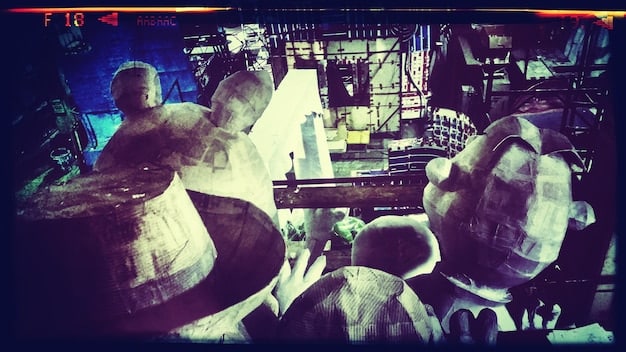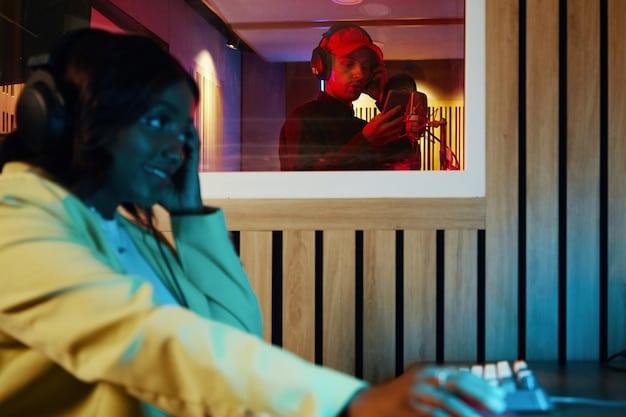AI’s Impact on Brazilian Film: Revolutionizing Filmmaking by 2027?

The potential for artificial intelligence to profoundly reshape Brazilian film production by 2027 involves diverse applications, from pre-production through post-production, offering both revolutionary advancements and notable challenges to the industry’s established structures and creative processes.
The cinematic landscape is constantly evolving, with new technologies frequently emerging to challenge traditional methods and open up unprecedented creative avenues. Among these innovations, artificial intelligence stands out as a transformative force, prompting critical
examinations of its pervasive reach. This article delves into The Impact of AI on Brazilian Film Production: Will Artificial Intelligence Revolutionize Filmmaking by 2027?, exploring how this technology could reshape one of the world’s most vibrant and distinctive film industries.
Understanding AI in Film Production
Artificial intelligence, often perceived as a futuristic concept, is already making significant inroads across various industries, and filmmaking is no exception. Its application in cinema spans a broad spectrum, from enhancing mundane tasks to assisting in complex creative decisions. Understanding these foundational applications is crucial to forecasting its deeper impact, particularly within a dynamic and culturally rich context like Brazilian cinema.
AI’s role can extend into every facet of the filmmaking process, from script development and pre-visualization to production logistics, editing, and distribution. Each of these stages presents unique opportunities for AI to optimize workflows, reduce costs, and potentially unlock new forms of artistic expression. However, this also raises pertinent questions about the balance between technological efficiency and human creative contribution, a dialogue that is becoming increasingly central in the global film community.
Pre-Production: From Script to Storyboard with AI
In the pre-production phase, AI can revolutionize how stories are conceived and planned. Script analysis tools, for instance, can evaluate narratives for market viability, predict audience reception, and even identify common tropes or repetitive elements. This doesn’t mean AI writes the script wholesale, but rather acts as an analytical partner, offering data-driven insights to screenwriters.
- Script Evaluation: AI models can analyze existing scripts to identify genre patterns, predict potential box office success, and even suggest character development arcs based on vast datasets of successful films.
- Idea Generation: While true creativity remains human, AI can assist in brainstorming by generating character concepts, plot twists, or even entire scene outlines based on specified parameters.
- Pre-visualization Enhancements: AI-powered tools can quickly generate detailed storyboards and animatics from textual descriptions, significantly accelerating the visual planning stage and allowing filmmakers to iterate on ideas faster.
- Casting Suggestions: AI algorithms can analyze actor performance data and historical box office returns to suggest suitable cast members, optimizing for both talent and market appeal.
Such capabilities could empower Brazilian filmmakers with powerful analytical tools, helping them to refine their stories and pitches more effectively for both domestic and international markets. The ability to quickly iterate on visual concepts and predict audience engagement could be a game-changer, fostering a more efficient and data-informed decision-making process from the very beginning.
Production: Streamlining On-Set Operations
During the intense production phase, AI’s applications shift towards logistical optimization and technical assistance. Its ability to process vast amounts of data in real-time can lead to unprecedented efficiencies on set, from equipment management to virtual cinematography. This is where AI’s presence becomes less about creative input and more about operational excellence.
Consider the complexities of coordinating a large film crew, managing equipment, and adhering to strict schedules. AI can play a crucial role in predicting potential delays, optimizing shooting schedules based on weather patterns or cast availability, and even managing inventory for props and costumes. These functionalities can significantly reduce overheads and ensure smoother, more predictable production timelines, critical for budget-conscious Brazilian productions.
AI’s Role in Post-Production and Distribution
Once filming wraps, the post-production phase is where raw footage transforms into a polished cinematic work. Traditionally, this is a labor-intensive period involving meticulous editing, visual effects, sound design, and color grading. AI is poised to revolutionize these processes, offering tools that can automate tedious tasks, enhance creative outputs, and accelerate the overall post-production timeline.
Beyond the creation, AI also steps into the crucial realm of distribution and marketing. Understanding audience preferences, optimizing content for various platforms, and even generating personalized marketing campaigns are areas where AI’s analytical power can significantly boost a film’s reach and success. For Brazilian cinema, this could mean greater access to global audiences and more effective engagement with diverse demographics.
Editing and Visual Effects with AI Assistance

AI algorithms can learn from vast archives of edited films to suggest optimal cuts, pacing, and scene transitions, assisting editors in assembling compelling narratives more efficiently. While human creativity remains paramount, AI becomes a powerful assistant, handling the more analytical and repetitive aspects of editing.
In visual effects, AI’s capabilities are truly transformative. From automating rotoscoping and keying to generating realistic CGI elements and performing sophisticated de-aging or digital makeup effects, AI significantly reduces the time and resources required for complex visuals. This could level the playing field for Brazilian filmmakers, allowing them to achieve Hollywood-level visual quality without the prohibitive costs.
- Automated Editing: AI can analyze dialogue, sound, and visual cues to propose initial edits, speeding up the assembly process and allowing human editors to focus on nuanced storytelling.
- VFX Simplification: Complex visual effects, such as generating realistic crowd scenes or simulating environmental phenomena, can be streamlined using AI, reducing manual labor and rendering times.
- Sound Design Enhancement: AI can assist in cleaning up audio, removing unwanted noise, and even generating ambient sounds or scoring suggestions based on emotional content.
- Color Grading Automation: AI tools can analyze footage and provide optimal color grading suggestions to achieve a desired mood or consistency, further polishing the final look of the film.
These advancements streamline workflows and offer new creative possibilities, allowing Brazilian productions to allocate resources more strategically towards artistic innovation rather than manual drudgery. The rapid evolution of these tools means that by 2027, their integration into standard post-production pipelines could be widespread.
AI in Film Distribution and Marketing
The success of a film hinges not just on its quality but also on its ability to reach the right audience. AI offers sophisticated tools for distribution and marketing, moving beyond traditional methods to data-driven strategies. This includes predictive analytics for audience targeting, personalized content recommendations, and optimized release strategies across diverse platforms.
For Brazilian cinema, which often seeks to expand its global footprint, AI can provide invaluable insights into international market trends and audience preferences. By analyzing viewership data from streaming platforms, social media engagement, and critical reviews, AI can help tailor marketing campaigns to specific demographics, ensuring content resonates more deeply with its intended viewers. This direct, targeted approach contrasts sharply with generalized marketing, offering a more efficient use of resources.
Furthermore, AI can assist in the localization of content, from precise subtitle generation to AI-powered voice dubbing that maintains emotional nuances and character authenticity. This could democratize access to Brazilian films worldwide, overcoming language barriers and cultural divides more effectively than ever before.
Challenges and Ethical Considerations for AI in Brazilian Film
While the promises of AI in filmmaking are compelling, its integration is not without significant challenges and ethical dilemmas. For the Brazilian film industry, these include economic accessibility, workforce displacement, and the profound questions surrounding creative ownership and artistic integrity. Addressing these concerns is crucial to ensure that AI serves as an augmentative force, rather than a disruptive one, preserving the unique identity and human element of Brazilian cinema.
The cost of implementing advanced AI tools can be prohibitive for independent filmmakers and smaller studios, potentially exacerbating existing inequalities within the industry. Moreover, the fear of AI replacing human jobs is a genuine concern that needs careful consideration and proactive planning.
Economic Accessibility and Workforce Displacement
The initial investment required for cutting-edge AI technologies can be substantial, posing a significant barrier for many Brazilian film production houses, especially smaller, independent studios. This economic divide could widen the gap between well-funded productions and those operating on tighter budgets, potentially stifling diverse voices and narratives.
A more pressing concern is the potential for AI to displace human labor. Tasks traditionally performed by assistant editors, animators, and even some specialized technicians could be partially or fully automated. This necessitates a proactive approach to workforce retraining and development within the Brazilian film industry, ensuring that professionals can adapt to new roles that leverage AI as a tool rather than being replaced by it. The transition requires careful management to avoid severe economic disruption for thousands of skilled workers.
Creative Ownership and Artistic Integrity
The rise of AI in creative processes raises complex questions about intellectual property and artistic integrity. If an AI system generates a script or significantly contributes to visual elements, who holds the copyright? How is the human artist’s unique vision maintained when AI algorithms propose creative solutions? These are not merely philosophical questions but legal and ethical challenges that require clear guidelines and frameworks.
Brazilian filmmakers, known for their distinct storytelling and artistic expression, might worry about AI diluting their unique voices or standardizing creative outputs to fit algorithmic preferences. The goal should be to ensure AI acts as a creative partner, enhancing human capabilities without diminishing the human touch that defines exceptional cinema.
- Copyright Issues: Clarifying ownership for AI-generated content is paramount to protect creators’ rights and prevent disputes.
- Artistic Authenticity: Ensuring AI tools augment, rather than dictate, artistic choices is crucial for maintaining the emotional depth and unique perspective of human storytelling.
- Ethical Data Use: Safeguarding data privacy and ensuring ethical use of training datasets are critical when AI analyzes vast amounts of public and private content.
- Bias in Algorithms: AI models can perpetuate biases present in their training data, potentially leading to stereotypical representations or limited creative outputs if not carefully managed.
Addressing these concerns through active dialogue within the film community, combined with policy development, will be essential for AI to be adopted responsibly in Brazil. The balance between technological advancement and humanistic values will define the future of filmmaking in the country.
Brazilian Film in 2027: A Hybrid Future?
Looking ahead to 2027, it’s highly probable that the Brazilian film industry will adopt a hybrid model, integrating AI tools into existing workflows while preserving the invaluable human element of creation. This future envisions a scenario where AI serves as a powerful assistant, taking on repetitive or data-intensive tasks, thereby freeing up human talent to focus on nuanced storytelling, emotional depth, and unique artistic visions. The goal is not replacement, but enhancement.
The pace of AI integration will likely vary across different scales of production. Larger studios with greater financial resources may adopt AI more rapidly and comprehensively, perhaps even pioneering new AI-driven techniques. Conversely, independent filmmakers and smaller production houses might selectively integrate more accessible AI tools, focusing on specific pain points like automated editing or simplified visual effects, aiming for efficiency without compromising their artistic independence or financial viability.
Adapting to the New Technological Landscape
For the Brazilian film industry to thrive in this new technological era, adaptation is key. This involves significant investment in infrastructure, training programs, and research and development specifically tailored to the nuances of local production. Such investments will ensure that Brazilian filmmakers are not merely consumers of global AI innovations but active contributors and innovators themselves.
Educational institutions will play a vital role in preparing the next generation of filmmakers for an AI-infused industry. Curricula will need to be updated to include AI literacy, prompt engineering, and collaborative workflows that integrate human creativity with machine capabilities. This forward-thinking approach will safeguard against potential job displacements by equipping professionals with relevant skills.
- Investment in Infrastructure: Upgrading studios and post-production facilities with AI-compatible hardware and software will be essential.
- Training and Education: Developing tailored programs for filmmakers, editors, and VFX artists to learn how to effectively utilize AI tools.
- Policy Development: Establishing ethical guidelines and legal frameworks to address copyright, data privacy, and labor implications of AI in film.
- International Collaboration: Engaging with global AI and film communities to share best practices and foster innovation.
The Brazilian film industry’s journey towards 2027 will be defined by its embrace of innovation while firmly rooting itself in its rich cultural heritage. The transition will require a delicate balance of technological adoption and the preservation of human creativity, fostering an environment where AI serves as a catalyst for new forms of storytelling.
Future Narratives and Creative Freedom in an AI Era
The most exciting aspect of AI’s integration into Brazilian film is its potential to unlock new narrative possibilities and expand creative freedom. By automating logistical and technical burdens, AI can free filmmakers to explore more ambitious storylines, experiment with innovative visual styles, and delve deeper into complex themes. This liberation from tedious tasks could lead to a renaissance of creativity, allowing Brazilian cinema to push boundaries and explore uncharted artistic territories.
Imagine independent filmmakers being able to produce visually stunning films with limited budgets, or documentarians gaining unprecedented access to remote locations through AI-powered drone technology. The ability to simulate complex historical settings or fantastical worlds with greater ease could open up genres previously considered financially prohibitive for non-Hollywood productions. This democratization of high-end production capabilities could significantly diversify the content produced within Brazil.
However, maintaining a distinctly Brazilian voice and perspective amidst global technological uniformity will be paramount. The challenge will be to integrate AI without sacrificing the unique cultural nuances, storytelling traditions, and experimental spirit that define Brazilian cinema. This requires a conscious effort from filmmakers and policymakers to ensure technology serves artistic expression, not the other way around.
The future of Brazilian film in an AI era is not about machines replacing artists, but about artists leveraging machines to tell more compelling, visually stunning, and impactful stories. By 2027, AI could be an indispensable partner for Brazilian filmmakers, enabling them to reach new heights of creativity and global recognition.
| Key Point | Brief Description |
|---|---|
| 🎬 Pre-Production Efficiency | AI analyzes scripts, predicts audience reception, and aids in rapid pre-visualization and casting, enhancing early-stage planning. |
| ✂️ Post-Production Revolution | AI automates editing, streamlines VFX, and enhances sound design, dramatically cutting time and costs. |
| 💸 Economic & Ethical Hurdles | Accessibility costs and potential job displacement pose challenges, along with ethical concerns around ownership and bias. |
| 🇧🇷 Hybrid Future for Brazil | Brazilian cinema likely adopts a hybrid model by 2027, integrating AI to enhance creative freedom while preserving human input. |

Frequently Asked Questions About AI in Brazilian Film
▼
While AI will automate some repetitive tasks, it’s more likely to augment human capabilities rather than fully replace jobs. The focus will shift towards new roles requiring AI proficiency, collaborative effort, and uniquely human creative input.
▼
As AI technology matures, more accessible and cost-effective tools are emerging. Cloud-based AI services, open-source projects, and subscription models will likely democratize access for independent creators and smaller studios in Brazil.
▼
Key ethical concerns include copyright for AI-generated content, potential biases in algorithms, data privacy, and maintaining artistic integrity. These issues require ongoing dialogue and policy development within the industry.
▼
The risk of standardization exists if AI is used uncritically. However, by leveraging AI as a creative assistant, Brazilian filmmakers can free up resources to explore unique cultural narratives and push artistic boundaries, ensuring diversity.
▼
By 2027, AI is expected to have a noticeable impact, especially in post-production and distribution. Its full revolutionary potential will depend on broad adoption, infrastructure development, and the industry’s willingness to adapt and innovate.
Conclusion
The journey towards 2027 suggests that artificial intelligence will undoubtedly reshape Brazilian film production, not by replacing human creativity but by augmenting it. From streamlining pre-production logistics and enhancing visual effects to revolutionizing distribution strategies, AI offers unprecedented tools for efficiency and artistic ambition. However, navigating the challenges of economic accessibility, potential workforce shifts, and ethical concerns surrounding creative ownership will be critical. The industry’s success hinges on a balanced approach—one that embraces technological innovation while vigorously preserving the unique, vibrant cultural identity and human element at the heart of Brazilian cinema. Ultimately, AI holds the promise to democratize high-end production, allowing Brazilian filmmakers to tell their diverse stories with greater impact and reach new global audiences, marking a truly transformative era for the art form.





